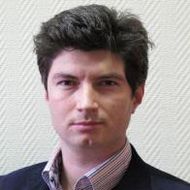Managers’ Role in an Era of Wild Cards: Seeing Opportunities Even at Rock Bottom

Global economic trends that have emerged in 2020 have been reevaluated in the context of the pandemic and low oil prices. Businesses have reconsidered their windows of opportunity and potential threats. This is evidenced by a foresight study conducted by the Association of Managers of Russia and co-authored by Alexander Chulok, Director of the HSE Institute for Statistical Studies and Economics of Knowledge.
‘Our goal was to find out what threats and windows of opportunity businesses see today. In order to initially identify them, we used our advanced development—the iFORA big data mining system. We then conducted a survey of more than 230 large companies,’ Alexander Chulok, Director of the ISSEK Institute for Statistical Studies and Economics of Knowledge, told the HSE News Service. The questionnaire was completed by heads of HR, PR, FCOs, marketing directors, and other top managers. The research results were presented on September 15 at the Forum of the Managers Association called The Future of Management Professions: Beyond the Digital Age.
The report shows that a manager’s role as an individual increases significantly in times of change. This is largely due to the fact that we are moving from understandable and well-predicted external conditions and trends to wild cards—events with low probability of occurrence but large-scale impact.
According to Alexander Chulok, at the beginning of 2020, the majority of experts agreed that we were entering an age of new global trends, and HSE has played a direct and significant role in identifying these trends. They include various consequences of climate change, the personification of medicine, health promotion, immune response development, the emergence of antibiotic-resistant bacteria, the ‘smart city’, virtual and augmented reality, and industrial 3D printers. They also include, of course, factors such as total digitalization and socio-demographic trends associated with population ageing, the emergence of an entire class of products for elderly people, which, according to existing estimates, can create a trillion-dollar market for goods and services.
‘But then we were dealt two wild cards—the pandemic and low oil prices,’ says Alexander Chulok. In particular, it appeared that the world was unprepared for the pandemic despite several years of innovation investment growth and R&D. The expert is sure that the combination of these two wild cards will produce very strong structural and transformational effects. The survey of managers was conducted just at the time when ‘these two wild cards foiled all plans’, which makes its result ‘even more interesting’.
Top managers regard the following trends as windows of opportunity:
the acceleration of total digitalization and the transition to smart systems;
the transfer of at least one third of employees to remote work;
the growing demand for customized products and services;
the growing importance of companies’ internal eco-environment in order to ensure employees’ productivity and motivation;
the lessening importance of the office as a workspace; the transition to online education.
For example, experts are still actively discussing the effectiveness of remote work. Respondents were asked to evaluate the transition of at least one third of their staff to remote work, explains Alexey Chulok. 73% of them said that this format was not a threat, but a window of opportunity. Notably, the questions were asked of the management, and not of rank-and-file employees. 78% of the respondents mentioned their intention to impose more stringent requirements with regard to employees’ competence, including their ability to fulfill combined functional duties.
‘I am seeing a shift away from the traditional Russian managerial idea of ‘I'm the boss—you're the fool’ to the idea of partnership and conscious behavior,’ says Alexander Chulok.
As for threats to business, Chulok notes the following particular feature: purely economic threats are now viewed as the most dangerous ones for companies, while ‘in our numerous previous surveys, we observed that respondents primarily cited either ineffective government policy in one form or another or sanctions’.
In this case, about two-thirds of the respondents noted the pace of recovery of the global and Russian economy. Many respondents are employed by companies that do business abroad or export their products—that is, companies that are deeply embedded in international global added value chains, the expert adds.
Top managers deem the following trends as threats:
A recovery of the Russian economy no earlier than in 2022;
The decline in global economic growth;
Complicated access to foreign markets; the strengthening of foreign policy factors;
A sharp decline in large-scale investments in long-term projects;
A drop in prices for feedstock and the likelihood of low prices to persist;
The growing impact of epidemiological factors on business; the expansion of the role of the state;
Increased cybersecurity risks;
A reduction in the pace of innovative development.
Also of note is that when asked how the pandemic affected demand for products and services, about half of the managers answered that it either had no negative impact or no impact at all. Only 6% of the respondents said that the impact on business was very negative. According to the report, the sectors that have benefited from the quarantine restrictions include agriculture, telecommunications, and online platforms. The crisis had a negative impact on construction, metallurgy, and the energy sectors. At the same time, representatives of trade and pharmaceuticals provided mixed answers— 50/50, the HSE expert says.
What managerial skills will be in demand in the future? The interviewed managers noted the ability to see opportunities in complicated, uncertain conditions; complex multi-level problem solving; emotional intelligence; critical thinking; and the ability to develop a vision and to bring people together around that vision.
Alexander Chulok

‘Please note that the competency that we called ‘the ability to see opportunities in wild cards’ now ranks first for managers. This is an integral competency. It implies both a managers’ global vision and the ability to put together a team, to listen to it and hear it. I believe this is a crucial result of the study. It shows that we now move on to a combination of hard skills and soft skills (nobody would doubt the need to have digital skills nowadays). As an HSE graduate, I can say that these are the very competencies of the future that our university gives its students.’
Companies with flexible management, a readiness to delegate responsibilities, and established teamwork structures achieve greater success even in the wild card era, Alexander Chulok says. ‘Based on the results of the survey, I am ready to suggest the following hypothesis,’ he says. ‘During the pandemic, a high-quality business model and management paradigm have no less impact on businesses’ efficiency than the economic sector to which that business belongs.’
See also:
‘An STI-Accelerated and Informed Future is Possible’
The Twelfth International Academic Conference ‘Foresight and Science, Technology and Innovation Policy’ is kicking off at HSE University on November 22. Alexander Sokolov, chair of the organising committee, talked to the HSE News Service about the evolution of the foresight agenda. Two of the conference speakers, Ibon Zugasti from Spain and Mlungisi Cele from South Africa, shared some highlights of their research.
UNESCO Chair on Future Studies Opens at HSE University
In 2022, a HSE University department joined the ranks of UNESCO Futures Literacy Chairs. This builds on the work of the ISSEK International Research and Educational Foresight Centre, and the activity of the Human Capital Multidisciplinary Research Centre. Professor Alexander Sokolov, head of the new department, Director of the International Research and Educational Foresight Centre, and Deputy Director of HSE ISSEK, spoke about the establishment, aims and objectives of the UNESCO Chair on Future Studies.
‘I Can’t Think of a Better Time for Young Researchers to Work in Foresight’
Foresight and STI Policy are among the symposium topics of the XXIII Yasin International Academic Conference. How has foresight developed in Canada? How did academic life change during the pandemic? What can early-career foresight researchers expect? The HSE News Service discussed these questions with Jonathan Calof, one of the symposium’s speakers.
HSE University Shapes Global Chain of Foresight
The COVID-19 pandemic has demonstrated our swift adaptation to big challenges and strengthened cooperation ties between researchers, politicians, and entrepreneurs on national and global levels. The accumulated life and goal setting practices in the new reality will be discussed on October 15–26, 2021 by participants of the XI International Academic Conference ‘Foresight and Science, Technology and Innovation Policy’ organised by the Institute for Statistical Studies and Economics of Knowledge (ISSEK).
HSE University Expands Cooperation with the World's Leading Foresight Centres
HSE University has signed cooperation agreements with two of the world's leading research centres, NISTEP (Japan) and TIFAC (India), which provide their governments with analytical support to inform science and technology forecasting and science and technology policy.
From Science Fiction to Designing the Future: Annual Foresight Conference Commences at HSE University
This week, researchers from all over the world have gathered online for the 10th annual International Academic Conference ‘Foresight and STI Policy’ at HSE University. One of the cross-cutting themes of the anniversary forum, which will be held from November 9 to 13, is lessons learned from the pandemic and the crisis’s effects in future scenarios.
'I Hope That I Will Be Able to Travel to Moscow to Be with My HSE Colleagues and Friends Soon'
Jonathan Calof has been cooperating with HSE since 2009. In an interview with HSE News Service he talks about how his involvement with HSE began, what projects he has been part of, and how he has organized his online work during the recent lockdown.
HSE ISSEK Researchers Sign Cooperation Agreement with Korean Colleagues
This May, HSE and the Science and Technology Policy Institute (STEPI, Republic of Korea) signed a cooperation agreement on science and advanced technology research. This agreement was signed by Leonid Gokhberg, HSE First Vice Rector, Director of the Institute for Statistical Studies and Economics of Knowledge, and Dr. Hwang-Hee Cho, STEPI President.
Building a Career Dedicated to Foresight and STI Policy Research
Following years of study and work in South America and Europe, Rafael Popper joined HSE Moscow as Professor of Foresight and STI Governance in January 2018. In addition to his job at HSE, he is Principal Scientist in Business, Innovation and Foresight at a world leading research and technology organization (RTO) called VTT Technical Research Centre of Finland. With a PhD on 21st Century Foresight from the University of Manchester, Popper has built a career on wide-ranging research of issues in foresight and STI policy. In a recent interview with the HSE News Service, he spoke in depth about his research interests, philosophy on teaching, collaboration across HSE and his love of languages, among other topics.
'HSE is Now Russia’s Largest Centre for Empirical Research'
Leonid Gokhberg, HSE First Vice Rector, Director of the Institute for Statistical Studies and Economics of Knowledge, spoke on his first steps in academia, working with foreign researchers, on foresight research as well as shared his thoughts on HSE research development.


